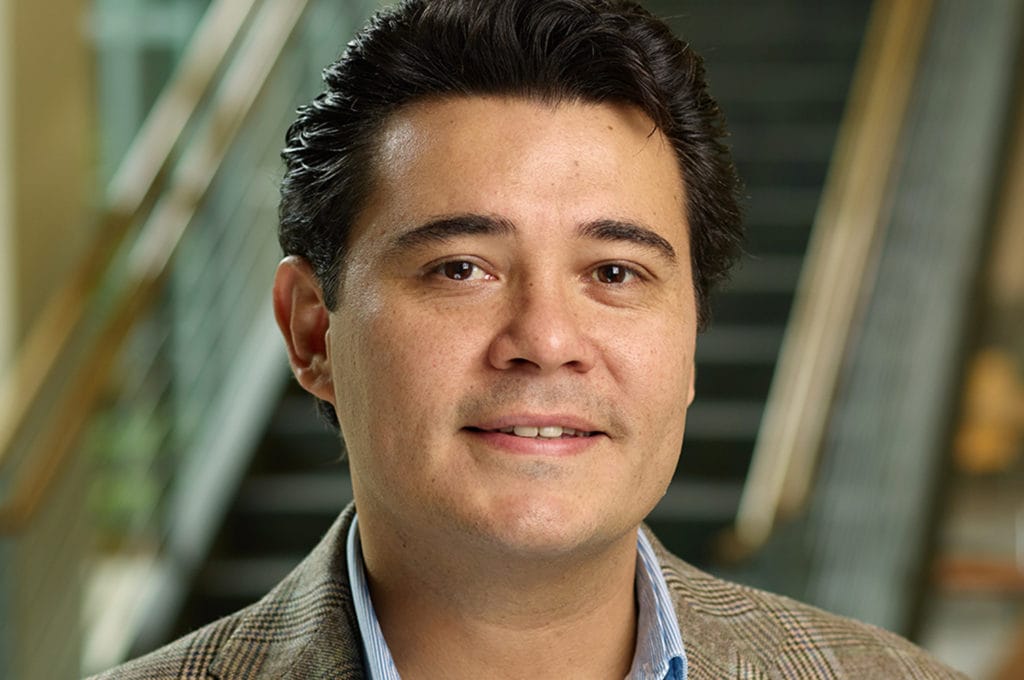New Professor Javier Rodríguez Studies Politics’ Ramifications on Health Outcomes

CGU recently welcomed Javier Rodríguez, a new faculty member in the School of Social Science, Policy & Evaluation’s Division of Politics & Economics. The scholar, whose research studies the political causes and consequences of socioeconomic and racial disparities in health, is tackling a critical question of our age: Why isn’t more attention being paid to the connections between health outcomes and policy decisions?
Rodríguez received a master’s and doctoral degree in political science at UCLA; at CGU he holds the post of Mary Toepelt Nicolai and George S. Blair Assistant Professor.
What prompted you to specialize in the direction of politics as it’s related to health policy and health issues? Did you feel it was an area badly in need of researchers and scholars?
The interdisciplinary alliance between political science and public health in my research originated because of three observations:
- Policy-makers, the media, advocates, and academic researchers openly accept the notion that health policies and programs have a powerful effect on population health.
- Policy- and decision-making processes that allocate major public goods and services and health-promoting resources happen in government.
- There is a surprisingly enormous scarcity of debate and research linking critical health outcomes to political variables.
Interestingly enough, I also noticed that this was not the case in other parts of the world. So, why is it that in the US we are not talking about these issues?
Most people probably haven’t asked that question. Why aren’t these issues being discussed?
Think about it: The government of the US is the most powerful institution that has ever existed; The annual budget for our major health care programs alone is well over a trillion dollars (the biggest—by far—among all other categories); and there are 2.7 million annual deaths in the US of which the great majority are related to health. Not to war, not to crime, not to accidents—health.
What else could be more important than the relationship between politics and health? Why is it that we are not debating and doing research on how the US government is administering and deciding on critical issues of life and death? These two questions, based on the observations outlined above, led me to the research that I do.
Heather Campbell, the chair and a professor in the Department of Politics & Government, said that your arrival addresses a much-needed area of public policy. For the lay public, what aspect of public policy do you plan to engage at CGU?
In the midst of the 19th century, [physician and public health pioneer] Rudolf Virchow said, “Medicine is a social science and politics is nothing else but medicine on a large scale.” What Virchow was implying with this assertion is the fact that politics is itself a powerful social determinant of health. Time passed for science to determine that societal inequalities are exquisitely translated into health inequalities; that societal factors—well above and beyond genetic ones—determine the health of populations.
To put these terms into perspective, consider this: In the US, the difference in life expectancy between men at the top and bottom of the income distribution is about 15 years. As [University of Illinois public health Professor] S. Jay Olshansky and his colleagues put it, in terms of health inequalities, there is more than one America. Further, socioeconomic gaps are widening over time. So, if a year of human life is the most valuable unit-asset of our species, then the inequalities that block the opportunities to live a longer and enjoyable life constitute the most critical of all inequalities. If “politics is medicine on a large scale,” to address the politics-specific problems and solutions that illuminate our understanding of health inequalities is a decisive aspect of our present and future as a society—and as a democracy. And that is what I hope to help address at CGU.
You were at big schools for your education and postdoctoral training—so what do you think of CGU’s smaller community? Any culture shock in moving from a larger to a smaller institution?
I like the small community here—a lot. I haven’t felt a culture shock; maybe humans tend to be local animals. We carry out a good portion of our daily activities close to where we live; we tend to interact more often than not with the people in our immediate working environment; we establish networks on the basis of closeness, and we work more efficiently in small teams. In that sense, places like CGU liberate the mind and allow people with ideas to meet more easily. At CGU, collectivity comes into focus.
What do you see as the advantages of being a CGU professor? Is it the opportunities to work more closely with students, research opportunities connected with the entire consortium, or some combination of these things?
“Professor” is a paradoxical space—located between the search for knowledge and the transmission of it, where teaching is a learning experience as well. By this I mean that teaching and learning are not separate events; they are intimately co-founded. After all, that’s what education is about: learning self-teaching skills. This puts professors in an interesting situation, one in which they become students of their students. So, for the professor, everything is about the students! To work closely with students represents the means through which professors have a chance to re-discover and replenish themselves.
CGU is a special place where top-level research meets high-quality academic interaction. Both faculty members and students are recipients of enriching intellectual experiences. No doubt, the [Claremont Colleges] Consortium is a plus—the cherry on top of our multi-scoop educational dessert. The sum of its parts; none losing its distinctiveness and charm. We all are lucky to enjoy the fruits of such a fabulous tree.
Read more about Javier Rodríguez’s research on his faculty profile page.